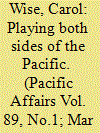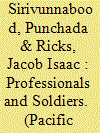|
|
|
Sort Order |
|
|
|
Items / Page
|
|
|
|
|
|
|
| Srl | Item |
| 1 |
ID:
143535


|
|
|
|
|
| Summary/Abstract |
Research on Solomon Islands and Papua New Guinea typically offers one of two explanations for the choices voters make, and the way these choices contribute to those countries’ poor political governance. The first explanation focuses on culture’s influence on the expectations that voters hold of politicians, contending that the Big Man style of local leadership traditionally found in both countries has shaped voter expectations in ways that cause voters to demand local or personal benefits issue_image_89_1_Wood2from MPs rather than good national governance. The second explanation hinges on rational choice models of voter behaviour and does not include culture in its list of explanatory variables. In this paper I argue that neither explanation fits well with key features of these countries’ politics. Drawing on quantitative and qualitative data I show that, while voters are broadly rational and can readily distinguish modern politics from traditional leadership, culture still matters. In particular, informal institutions, associated with the countries’ cultural contexts, influence voter behaviour and electoral collective action, and through this political governance
|
|
|
|
|
|
|
|
|
|
|
|
|
|
|
|
| 2 |
ID:
143537


|
|
|
|
|
| Summary/Abstract |
One of the most prominent trends in Latin America in the 2000s has been the proliferation of bilateral free trade agreements (FTAs) across the Pacific basin. Beginning with the path-breaking Chile-Korea FTA in 2004 up to the Costa Rica-Singapore FTA in 2013, the past decade has seen the negotiation of twenty-two cross-Pacific accords. China, too, has jumped on to the cross-Pacific FTA bandwagon, including its negotiation of separate bilateral FTAs with Chile (2006), Peru (2009), and Costa Rica (2011). This paper analyzes the origins, content, and preliminary outcomes of these three China-Latin America FTAs. The findings are threefold: 1) in contrast with other cross-Pacific FTAs, which include at least one developed country, the three FTAs analyzed in this paper constitute “south-south” FTAs; yet, in contrast with other south-south FTAs, these three China-Latin America accords approximate WTO+ standards vis-à-vis the World Trade Organization (WTO) and its new trade agenda (services, investment, and intellectual property rights); 2) although the motives for negotiating these developing- developing country accords varied, on the part of China and the countries themselves, this did not disrupt the march toward WTO+ status; and 3) while all three of these FTAs elude standard theoretical explanations for the negotiation of bilateral FTAs, the three Latin American countries do share similar reform trajectories and institutional affinities, which sheds light on the decision and capacity of each to negotiate a bilateral FTA with China.
|
|
|
|
|
|
|
|
|
|
|
|
|
|
|
|
| 3 |
ID:
143534


|
|
|
|
|
| Summary/Abstract |
Thailand’s military has recently reclaimed its role as the central pillar of Thai politics. This raises an enduring question in civil-military relations: why do people with guns choose to obey those without guns? One of the most prominent theories in both academic and policy circles is Samuel Huntington’s argument that professional militaries do not become involved in politics. We engage this premise in the Thai context. Utilizing data from a new and unique survey of 569 Thai military officers as well as results from focus groups and interviews with military officers, we evaluate the attitudes of Thai servicemen and develop a test of Huntington’s hypothesis. We demonstrate that increasing levels of professionalism are generally poor predictors as to whether or not a Thai military officer prefers an apolitical military. Indeed, our research suggests that higher levels of professionalism as described by Huntington may run counter to civilian control of the military. These findings provide a number of contributions. First, the survey allows us to operationalize and measure professionalism at the individual level. Second, using these measures we are able to empirically test Huntington’s hypothesis that more professional soldiers should prefer to remain apolitical. Finally, we provide an uncommon glimpse at the opinions of Thai military officers regarding military interventions, adding to the relatively sparse body of literature on factors internal to the Thai military which push officers toward politics
|
|
|
|
|
|
|
|
|
|
|
|
|
|
|
|
| 4 |
ID:
143536


|
|
|
|
|
| Summary/Abstract |
This research applies a neoclassical realist framework to explore the causes and consequences of Russia’s recent “reorientation to Asia.” Based on an analysis of publications and fieldwork conducted in Russia, the paper examines both the international systemic and the Russian domestic factors that have contributed to this important change in Russia’s foreign policy. At the system level, Russia’s turn to Asia can be understood as a part of its longer campaign of balancing against American unipolar domination. issue_image_89_1_Korolev_Russia in the EastAt the unit level, economic demands to develop Russia’s eastern territories, together with the complex socio-political processes of post-Soviet identity formation, generated a political environment that was conducive to Asia-oriented policies. Russia’s reorientation to Asia implies not only comprehensive strategic cooperation with specific Asian powers, such as China, South Korea, or Japan, but also a “reinvention” of Russia as a Eurasian power. Given Russia’s cross-continental spread and economic and military capabilities, its reorientation to Asia may have significant implications for the balance of power in the current world system.
|
|
|
|
|
|
|
|
|
|
|
|
|
|
|
|
|
|
|
|
|